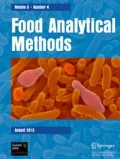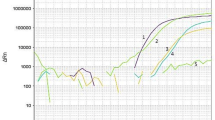Abstract
Deoxyribonucleic acid (DNA) extraction, which is the mainstay of molecular amplification for food pathogen detection procedure, is dependent on laboratory infrastructure, cumbersome methods, and time consumption. To tackle these dependencies, we developed an enhanced mussel-inspired cellulose card for the convenient, eco-friendly, and rapid DNA extraction from bacteria present in food. This enhanced cellulose mussel-inspired DNA adhesive card (BDA card) was successfully prepared using Na + through the self-polymerization of biopolymer polyvalent ions and 3,4-dihydroxy-l-phenylalanine (L-Dopa). We observed that, when the biopolymer surface modification of the cellulose was NaCl-doped, the DNA extraction and purification performances of the obtained BDA card were enhanced when compared to the performance of the cellulose modified with the biopolymer doped with HCl. After the surface modification, the previously modified cellulose card was characterized with the Fourier transform infrared spectroscopy (FTIR), X-ray diffraction (XRD), and scanning electron microscopy (SEM). The DNA extraction performances as well as the quality of the bacteria genomic DNA extracted were equally measured. The Na + -doped DNA adhesive cellulose card (BDA card) depicted the best bacteria genomic DNA extraction performances. When compared to commercially available bacteria genomic DNA extraction kits, the BDA card portrayed better DNA extraction performances, in a one-step extraction protocol. It allowed easy and convenient DNA extraction. The whole genomic DNA extraction process could be completed in 10 min. The concentration of the genomic DNA extracted from overnight bacteria culture was highest when extracted with the BDA card 459.39 ± 86 ng/µl as compared to Ezup and PureLink genomic DNA kits. When tested with spiked chicken, it was statistically equal to the Mag-MK food genomic DNA extraction kit. The proposed method provides a simple, efficient, eco-friendly, and convenient approach for bacteria genomic DNA extraction and purification from samples.






Similar content being viewed by others
Data Availability
The raw data used and analyzed in this research were generated at the Synergetic Innovation Center of Food Safety and Nutrition, State Key Laboratory of Food Science and Technology, School of Food Science. Derived data supporting the findings of this study are available from the corresponding author upon request.
References
Ali N, Rampazzo RDCP, Costa ADiT, Krieger MA (2017) Current nucleic acid extraction methods and their implications to point-of-care diagnostics. Biomed Res Int 2017. https://doi.org/10.1155/2017/9306564
An R, Jia Y, Wan B et al (2014) Non-enzymatic depurination of nucleic acids: factors and mechanisms. PLoS ONE. https://doi.org/10.1371/journal.pone.0115950
Chen H, Rangasamy M, Tan SY, et al (2010) Evaluation of five methods for total DNA extraction from western corn rootworm beetles. PLoS One 5:. https://doi.org/10.1371/journal.pone.0011963
Choi JR, Tang R, Wang SQ et al (2015) Paper-based sample-to-answer molecular diagnostic platform for point-of-care diagnostics. Biosens Bioelectron 74. https://doi.org/10.1016/j.bios.2015.06.065
Cocca M, D’Arienzo L, D’Orazio L (2011) Effects of different artificial agings on structure and properties of Whatman paper samples. ISRN Mater Sci. https://doi.org/10.5402/2011/863083
El S, Ball V (2020) Colloids and Surfaces B : Biointerfaces polydopamine as a stable and functional nanomaterial. 186:. https://doi.org/10.1016/j.colsurfb.2019.110719
Farrell RE (2010) RNA Methodologies. RNA Methodologies. Elsevier Inc. https://doi.org/10.1016/C2009-0-01850-9
Gamba C, Hanghøj K, Gaunitz C et al (2016) Comparing the performance of three ancient DNA extraction methods for high-throughput sequencing. Mol Ecol Resour. https://doi.org/10.1111/1755-0998.12470
Gan W, Zhuang B, Zhang P et al (2014) A filter paper-based microdevice for low-cost, rapid, and automated DNA extraction and amplification from diverse sample types. Lab Chip. https://doi.org/10.1039/c4lc00686k
Ganesh I, Tran BM, Kim Y et al (2016) An integrated microfluidic PCR system with immunomagnetic nanoparticles for the detection of bacterial pathogens. Biomed Microdevices. https://doi.org/10.1007/s10544-016-0139-y
Green MR, Sambrook J (2019) Spun-column chromatography. Cold Spring Harb Protoc. https://doi.org/10.1101/pdb.prot100594
Han X, Tang F, Jin Z (2018) Free-standing polydopamine films generated in the presence of different metallic ions: the comparison of reaction process and film properties. RSC Adv 8:18347–18354. https://doi.org/10.1039/c8ra02930j
Havelaar AH, Kirk MD, Torgerson PR et al (2015) World health organization global estimates and regional comparisons of the burden of foodborne disease in 2010. PLoS Med 12. https://doi.org/10.1371/journal.pmed.1001923
Hong G, Meng Y, Yang Z et al (2017) Mussel-inspired polydopamine modification of bamboo fiber and its effect on the properties of bamboo fiber/polybutylene succinate composites. BioResources 12. https://doi.org/10.15376/biores.12.4.8419-8442
Hospodarova V, Singovszka E, Stevulova N (2018) Characterization of cellulosic fibers by FTIR spectroscopy for their further implementation to building materials. Am J Anal Chem. https://doi.org/10.4236/ajac.2018.96023
Huang Z, Zhao Y, Liu B, et al (2020) Stronger adsorption of phosphorothioate DNA oligonucleotides on graphene oxide by van der Waals forces. Langmuir 36:. https://doi.org/10.1021/acs.langmuir.0c02761
Jung JY, Yoon HK, An S et al (2018) Rapid oral bacteria detection based on real-time PCR for the forensic identification of saliva. Sci Rep. https://doi.org/10.1038/s41598-018-29264-2
Katevatis C, Fan A, Klapperich CM (2017) Low concentration DNA extraction and recovery using a silica solid phase. PLoS ONE 12:e0176848. https://doi.org/10.1371/journal.pone.0176848
Li Q, Qi W, Su R, He Z (2017) Enhanced enzymatic hydrolysis and changes in structure of cellulose regenerated with ionic liquids. Cellul Chem Technol 51(7–8):593–600. https://www.google.com/search?q=issn%05769787
Liebscher J (2019) Chemistry of polydopamine – scope, variation, and limitation. European J Org Chem 2019:4976–4994. https://doi.org/10.1002/ejoc.201900445
Liu D, Zhu Y, Li N et al (2020) A portable microfluidic analyzer for integrated bacterial detection using visible loop-mediated amplification. Sensors Actuators, B Chem 310:127834. https://doi.org/10.1016/j.snb.2020.127834
Liu J, Liu SB, Liu B (2017) Showcasing a comprehensive review of attaching DNA oligonucleotides to gold nanoparticles for bioanalytical applications from the research group of As featured in: Methods for preparing DNA-functionalized gold nanoparticles, a key reagent of bioanalytical chemistry. https://doi.org/10.1039/c7ay00368d
Ma YD, Li KH, Chen YH et al (2019) A sample-to-answer, portable platform for rapid detection of pathogens with a smartphone interface. Lab Chip. https://doi.org/10.1039/c9lc00797k
Martzy R, Bica-Schröder K, Pálvölgyi ÁM et al (2019) Simple lysis of bacterial cells for DNA-based diagnostics using hydrophilic ionic liquids. Sci Rep 9:1–10. https://doi.org/10.1038/s41598-019-50246-5
Meng Y, Liu P, Zhou W, et al (2018) Bioorthogonal DNA adsorption on polydopamine nanoparticles mediated by metal coordination for highly robust sensing in serum and living cells. ACS Nano 12:. https://doi.org/10.1021/acsnano.8b03019
Milne E, Van Bockxmeer FM, Robertson L et al (2006) Buccal DNA collection: comparison of buccal swabs with FTA cards. Cancer Epidemiol Biomarkers Prev. https://doi.org/10.1158/1055-9965.EPI-05-0753
Munajad A, Subroto C, Suwarno, (2018) Fourier transform infrared (FTIR) spectroscopy analysis of transformer paper in mineral oil-paper composite insulation under accelerated thermal aging. Energies. https://doi.org/10.3390/en11020364
Oberacker P, Stepper P, Bond DM et al (2019) Bio-On-Magnetic-Beads (BOMB): open platform for high-throughput nucleic acid extraction and manipulation. PLoS Biol. https://doi.org/10.1371/journal.pbio.3000107
Oda Y, Sadakane K, Yoshikawa Y et al (2016) Highly concentrated ethanol solutions: good solvents for DNA as revealed by single-molecule observation. ChemPhysChem 17:471–473. https://doi.org/10.1002/cphc.201500988
Park BH, Oh SJ, Jung JH et al (2017) An integrated rotary microfluidic system with DNA extraction, loop-mediated isothermal amplification, and lateral flow strip based detection for point-of-care pathogen diagnostics. Biosens Bioelectron. https://doi.org/10.1016/j.bios.2016.11.063
Park HJ, Cho H, Jung HS et al (2019) Development of a DNA isolation device using poly(3,4-dihydroxy-L-phenylalanine)-coated swab for on-site molecular diagnostics. Sci Rep 9:1–10. https://doi.org/10.1038/s41598-019-44527-2
Psifidi A, Dovas CI, Bramis G et al (2015) Comparison of eleven methods for genomic DNA extraction suitable for large-scale whole-genome genotyping and long-term DNA banking using blood samples. PLoS ONE. https://doi.org/10.1371/journal.pone.0115960
Shahrokhian S, Ranjbar S (2019) Development of a sensitive diagnostic device based on zeolitic imidazolate frameworks-8 using ferrocene–graphene oxide as electroactive indicator for Pseudomonas aeruginosa detection. ACS Sustain Chem Eng 7:12760–12769. https://doi.org/10.1021/acssuschemeng.9b01314
Sinha AS, Dang S, Sondergeld CH, Rai CS (2017) Impact of solvent extraction on surface area measurements in organic-rich shales using nitrogen adsorption. In: Proceedings of the 5th Unconventional Resources Technology Conference. American Association of Petroleum Geologists, Tulsa, OK, USA
Tang R, Yang H, Gong Y et al (2017) A fully disposable and integrated paper-based device for nucleic acid extraction, amplification and detection. Lab Chip. https://doi.org/10.1039/C6LC01586G
The K, Trinh L, Stabler RA, Yoon N (2020) Sensors and actuators B : chemical fabrication of a foldable all-in-one point-of-care molecular diagnostic microdevice for the facile identification of multiple pathogens. Sensors Actuators B Chem 314:128057. https://doi.org/10.1016/j.snb.2020.128057
Wang Y, Ma X, Ding C, Jia L (2015) PH-responsive deoxyribonucleic acid capture/release by polydopamine functionalized magnetic nanoparticles. Anal Chim Acta 862:33–40. https://doi.org/10.1016/j.aca.2015.01.009
Wong YP, Othman S, Lau YL et al (2018) Loop-mediated isothermal amplification (LAMP): a versatile technique for detection of micro-organisms. J Appl Microbiol 124. https://doi.org/10.1111/jam.13647
WHO (2015) World Health Organization. Who estimates of the global burden of foodborne diseases: foodborne disease burden epidemiology reference group 2007-2015. Encyclopedia of Parasitology, 1–265. Retrieved from www.who.int/foodsafety/publications/foodborne_disease/fergreport/en/
Wu M, KempaiahR,Huang P-JJ, et al (2011) Adsorption and Desorption of DNA on Graphene Oxide Studied by Fluorescently Labeled Oligonucleotides 27:2731–2738. https://doi.org/10.1021/la1037926
Yan M, Li W, Zhou Z et al (2017) Direct detection of various pathogens by loop-mediated isothermal amplification assays on bacterial culture and bacterial colony. Microb Pathog. https://doi.org/10.1016/j.micpath.2016.10.025
Zhao F, Lee EY, Noh GS et al (2019) A robust, hand-powered, instrument-free sample preparation system for point-of-care pathogen detection. Sci Rep 9:1–11. https://doi.org/10.1038/s41598-019-52922-y
Zhong Z, Yao X, Gao X, Jia L (2017) Polydopamine-immobilized polypropylene microfuge tube as a pH-responsive platform for capture / release of DNA from foodborne pathogens. Anal Biochem 534:14–18. https://doi.org/10.1016/j.ab.2017.07.004
Zhou HX, Pang X (2018) Electrostatic Interactions in Protein Structure, Folding, Binding, and Condensation. Chemical Reviews. Am Chem Soc. https://doi.org/10.1021/acs.chemrev.7b00305
Zmerli I, Michel J-P, Makky A (2020) Bioinspired polydopamine nanoparticles: synthesis, nanomechanical properties, and efficient PEGylation strategy. J Mater Chem B 8:4489–4504. https://doi.org/10.1039/C9TB02769F
Funding
This study was funded by the 2020 Jiangsu Provincial Market Supervision Administration Science and Technology Plan Project (KJ204139), the National Key Research and Development Program of China 2018YFC1602800, the National Natural Science Foundation of China (31772069, 31801660), the Fundamental Research Funds for the Central Universities (1022050205205500), the national first-class discipline program of Food Science and Technology (JUFSTR20180303), and The Collaborative Innovation Center for Food Safety and Quality Control.
Author information
Authors and Affiliations
Corresponding authors
Ethics declarations
Ethical Approval
This article does not contain any studies involving a human participant or an animal being performed upon by any of the authors.
Informed Consent
Not applicable.
Conflict of Interest
Nanfack Vouffo Denise Carole declares that she has no conflict of interest. Jia Yang declares that he has no conflict of interest. Xiao Yuan declares that he has no conflict of interest. Jiadi Sun declares that she has no conflict of interest. Xiulan Sun declares that she has no conflict of interest. And Jian Ji declares that he has no conflict of interest.
Additional information
Publisher's Note
Springer Nature remains neutral with regard to jurisdictional claims in published maps and institutional affiliations.
Carole D. V. Nanfack and Jia Yang are co-first authors.
Supplementary Information
Below is the link to the electronic supplementary material.
Rights and permissions
About this article
Cite this article
Nanfack, C.D.V., Yang, J., Yuan, X. et al. 3, 4-Dihydroxy-l-phenylalanine Biopolymer Cellulose DNA Adhesive Card as an Enhanced Solid-Phase One-Step DNA Extraction Method from Foodborne Pathogens in Food Samples. Food Anal. Methods 15, 2069–2083 (2022). https://doi.org/10.1007/s12161-021-02177-z
Received:
Accepted:
Published:
Issue Date:
DOI: https://doi.org/10.1007/s12161-021-02177-z




